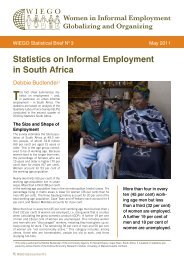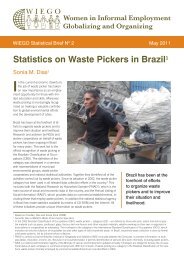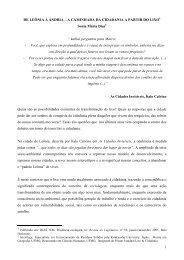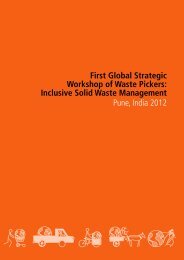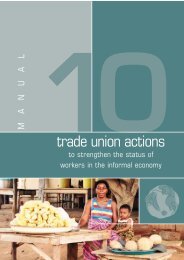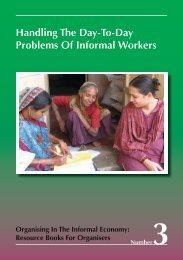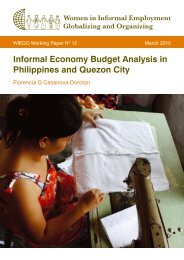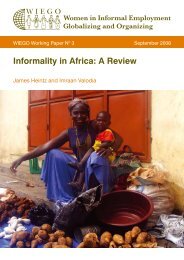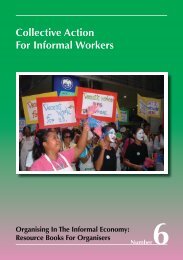Waste Pickers and Carbon Finance: Issues to Consider - WIEGO
Waste Pickers and Carbon Finance: Issues to Consider - WIEGO
Waste Pickers and Carbon Finance: Issues to Consider - WIEGO
- No tags were found...
Create successful ePaper yourself
Turn your PDF publications into a flip-book with our unique Google optimized e-Paper software.
<strong>WIEGO</strong> Technical Brief (Urban Policies) N o 7One key informant observed a “supply risk” inherent in this methodology. An offset project based onrecycling requires a constant <strong>and</strong> predictable supply of materials that could, at any time <strong>and</strong> for variousreasons, be disrupted. Another key informant observed that disputes could arise around the ownershipof the waste, <strong>and</strong> means <strong>to</strong> avoid such disputes would have <strong>to</strong> be considered before proceeding. 7 Yetanother key informant said that talks had taken place with a manufacturer that makes plastic bottlesin<strong>to</strong> fuel, but the challenge in entering in<strong>to</strong> a formal arrangement is that they (the MBO) cannot accessenough plastic bottles.Critically, <strong>and</strong> as pointed out by one interviewee, recycling requires space close <strong>to</strong> urban areas which, inIndia, for example, is very expensive. Therefore, municipal space would need <strong>to</strong> be acquired, <strong>and</strong> this wouldnecessitate a co-operative relationship, like a public/ private partnership, with municipal authorities, a relationshipthat in some cases would need <strong>to</strong> be built from scratch. According <strong>to</strong> another stakeholder, several wastepicker groups have had the experience of changes in municipal policy, where agreements made under oneelected body are not upheld by the next, suggesting that municipal partnerships may also carry some risk.A final aspect related <strong>to</strong> MBO capacity <strong>and</strong> meeting the requirements of carbon offset finance is that paymentsfor emission reduction is based on the verified results of the moni<strong>to</strong>ring data, so projects must bejudicious in the collection <strong>and</strong> s<strong>to</strong>rage of moni<strong>to</strong>ring data. (Peterson <strong>and</strong> Godin 2009: 8)A barrier mentioned by a number of key informants is that many waste picker MBOs simply do not havethe capacity <strong>to</strong> keep adequate records <strong>and</strong> deal with the necessary paperwork. Investments in buildingadministrative capacity, including better record-keeping, would therefore be required.Commercial ViabilityBesides issues related <strong>to</strong> requirements, methodology <strong>and</strong> MBO capacity, it is critical <strong>to</strong> consider actualcommercial viability when assessing the feasibility of a carbon offset project. Key aspects include whetherthe price for which carbon credits could be sold would justify the investment needed <strong>to</strong> develop a project,<strong>and</strong> whether there would ultimately be a buyer for any offsets generated by the project. As noted recentlyby one carbon credit stakeholder:...the CDM as a source of new emission-reduction projects in the developing world has effectively beendead for 12 months now, with the very low CER price making it almost impossible <strong>to</strong> justify developing anew CDM project.Andersen <strong>and</strong> Narayanan (2013)Others have noted that the carbon trading system is “profoundly weak” <strong>and</strong> has “essentially collapsed,”due <strong>to</strong> a number of fac<strong>to</strong>rs, including the global recession, the Eurozone crisis, <strong>and</strong> an associated declinein industrial production, meaning that few EU companies (Europe being the only significant carbonmarket) now need <strong>to</strong> <strong>to</strong>p up their carbon quotas (Harvey 2012) resulting in an oversupply of carboncredits. These <strong>and</strong> other fac<strong>to</strong>rs have combined <strong>to</strong>:...bring about a collapse in the price of UN credits, from highs <strong>to</strong>pping $20 before the financial crisis <strong>to</strong>less than $3 each <strong>to</strong>day. At such rates, many potential projects are not commercially viable. Financiers<strong>and</strong> project developers have ab<strong>and</strong>oned the market in droves.Harvey (2012)However, it should be kept in mind that new compliance markets, including California, Quebec, <strong>and</strong> others,are coming on stream, which may increase dem<strong>and</strong> for carbon credits. Also, the social component of therecycling activities of some waste picker MBOs may enable them <strong>to</strong> attract a higher price for their carbon7This has also been noted in Chintan (2009: 23): “Establishing indisputable ownership of the project activity is a prerequisite of any carbon markettransaction.”6




